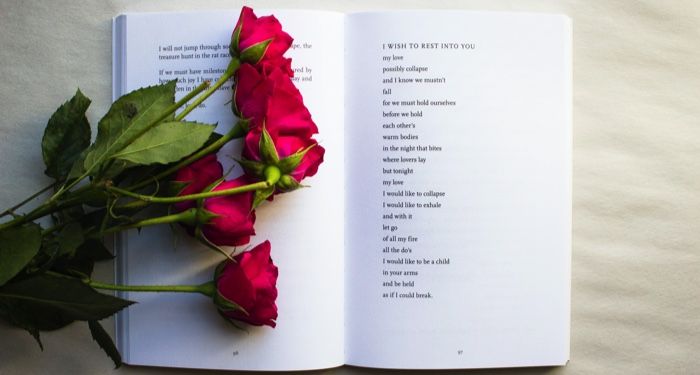
Memorizing Poetry: Why Verse and Prose Are Still Valid
Memorizing poetry is my way of life. Poetry uplifts our darkest days, and it’s natural to retain our faves to memory. In my younger days, my mother and I spent hours memorizing passages for exams. We would not rest until I could say the entire piece by heart. If I missed a line, we would start over! While these study sessions were exhausting, it helped me remember my class material!
Fast forward to 2005, when I met my poetry therapy community. Month after month, I would visit and share valuable poetry. Memorization reentered my world, but now through an artistic lens. As a result, I made many valuable friendships with people I still (virtually) gather with! Learning by rote shifted to a more approachable way of comprehension.
My reflections prompted a deep dive as to why memorizing poetry is essential to well being. This post covers both classical and modern poetic forms. I will also glance at what the critics say about poetry as a whole!
Memorizing Poetry for Academics
During the late 1800s, poetry ruled our academic curriculum. Poets such as Wordsworth and William Blake were a staple in children’s education. Memorizing poetry was highly respected. Social skills would flourish if one could recite Shakespeare’s sonnets by heart. Self-confidence in academics translated to a healthier life.
Metered poetry also has an ingrained spoken rhythm in each piece. For instance, Jane Austen’s “Ode to Pity” is equal parts lyrical and lovely. Her poetry (and later her novels, such as Sense and Sensibility) emanated with beauty. Committing poems to memory was an art form, lines peppered with timed beats.
Moreover, rote memorization promoted strong self-discipline. Poetic verse was strongly believed to heighten a deep appreciation of literature. A sharper brain blended with education led to a well rounded existence. Thus, poetry unlocked the door to success! No one found fault with such a journey!

A Sudden Shift
In the early 20th century, poetry’s display in language changed. First, lyrical, metered verse shifted to the narrated format of prose. Then, the importance for a more expressive flow of thought began to circulate the academic world. Gradually, people tossed out the iambic pentameter in exchange for an open, free verse format. Memorization was still respected, yet creativity was now highly encouraged.
Additionally, people viewed metered form as restrictive in nature. For example, a sonnet adheres to strict iambic pentameter. Beautifully spoken, yet tough to write. In contrast, prose holds no structural guideline. One only needs to spill their thoughts on a page. Now, retaining poetry was so much easier, since we share pieces from our souls.
Spoken Word Poetry to Memory
Spoken word poetry is characterized by rhyme, repetition, and word play. It gained popularity in the mid 1960s through the Beat Poet generation. Later, it encompassed the rock and hip hop genres of the ’80s and ’90s. Spoken word became a welcome outlet to memorize due to its roots in democracy. People now wished to create pieces dripping with life.
Don’t get me wrong, classical poetry is vital! It has a valuable place in the arts. Prose and spoken word poetry only broadened the scope of creativity. We have the liberty to choose the poetic form that best suits us.
Memorizing Poetry? Why?
In recent years, poetry has come under under fire. Questions such as “Does poetry make a difference?” and “Why learn poetry?” invades our culture. Articles plastered with “Can Poetry Matter?” sparks frequent debate. Poetic forms are just for colleges, nothing more. The people who favor poetry? Poets, of course, but no one else!
Moreover, Ofqual’s recent decision to make poetry optional greatly reduces its meaning in English Lit. Why bother remembering poetry when you don’t even need to study it? While I understand that it’s only temporary, this still sends a subtle message: you don’t need poetry. I couldn’t believe it!
Memorizing Poetry is Valid
Poetry continues to be a strong, emotional outlet. While public spaces are closed due to the pandemic, groups have moved to the virtual stage. Open mic nights and poetry workshops fill with people sharing poems committed to memory. Personally, I enjoy sharing Maya Angelou’s poetry. I talk about And Still I Rise to anyone who would listen!
To sum up, memorizing poetry leads to a gift. Once you retain a poem to memory, it will stay with you for life. Like a trusted friend, it will comfort you during the most challenging times. To quote Rumi: “Let yourself be silently drawn to the stronger pull of what you truly love. It will not lead you astray.”
Additional Links
For additional info about poetry, here are good places to start:
Advice on Reading Poetry for People Who Are Intimidated by Poetry—a wonderful article for those unsure about taking the poetic plunge!
On Memorizing Poetry—another contributor’s personal experiences with this creative craft!














